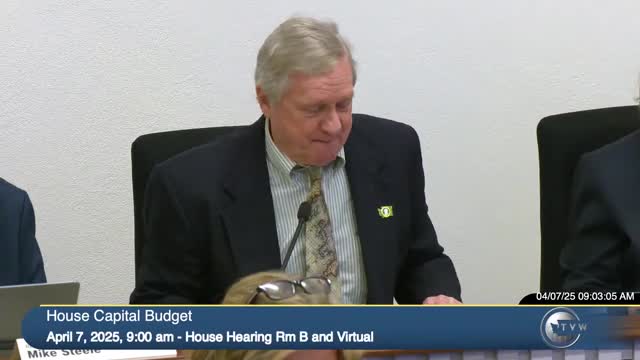Committee hears bill to extend deadline tied to Tiana Way Community Forest water milestones
Get AI-powered insights, summaries, and transcripts
Subscribe
Summary
The Capital Budget Committee on April 7 heard public testimony on Engrossed Senate Bill 5303, which would extend by 10 years the deadline to secure permits and funding for water facilities tied to the Tiana Way Community Forest in the Yakima River Basin, committee staff said.
The Capital Budget Committee on April 7 heard public testimony on Engrossed Senate Bill 5303, which would extend by 10 years the deadline to secure permits and funding for water facilities tied to the Tiana Way Community Forest in the Yakima River Basin, committee staff said.
Committee staff member Rob Hatfield briefed members on the bill, describing the Yakima Basin Integrated Water Resource Management Plan as “created to deliver benefits both to in stream and out of stream water uses.” Hatfield said the Tiana Way Community Forest—purchased under 2013 legislation—was intended to remain a community forest only if permits and funding were in place by June 30, 2025, to build facilities that would deliver 214,000 acre-feet of water for in‑stream and out‑of‑stream uses. Under the original authorization, if those milestones were not met the Board of Natural Resources could place the land into the common school trust.
The bill before the committee would extend the deadline by 10 years (to mid‑2035), and the House Agriculture and Natural Resources Committee adopted a striker that, Hatfield said, left in place the original requirement to make annual interest payments on the loan used to buy the land. “It remains in the bill,” Hatfield said, referring to the interest‑payment requirement. He also noted that an earlier fiscal note that showed an approximate $1.8 million biennial impact for the Department of Natural Resources was based on an earlier version of the bill that would have stopped the interest payments; because the interest provision was restored in the striker, Hatfield said he would not expect a fiscal impact to DNR from the current iteration.
Supporters of the Yakima Basin Integrated Plan told the committee the extension is needed to complete storage and conservation projects that together aim to meet or exceed the 214,000 acre‑foot milestone. Joe Blodgett, fisheries staff for the Yakama Nation, said the integrated plan grew from decades of conflict and collaboration and stressed the cultural and ecological importance of water. “Water is the utmost important to us as people,” Blodgett said, adding that restoration work in the Tiana Way area has protected riparian habitat and helped return previously extirpated fish stocks.
Brandon Parsons, director of river restoration at American Rivers, described long‑running conservation participation in the plan and said the conservation community remains committed to the work. Parsons said some partners have moved from uncertainty to active investment, pointing to a recent private purchase tied to a storage project known as Springwood Ranch. “We have been making good progress on our water supply milestones… but we need more time,” Parsons said.
Urban Eberhard, manager of the Kittitas Reclamation District, said multiple surface and groundwater projects throughout the basin could produce well more than the targeted 214,000 acre‑feet and expressed confidence that the storage goals in the bill can be met within the requested 10‑year extension. “We will be able to definitely meet the goals spelled out in that language,” Eberhard said.
Committee members asked about the bill’s status and the interest requirement. Representative Dye asked for clarification, and Hatfield confirmed that the interest payment language—originally removed in an earlier draft—was restored by the House Agriculture and Natural Resources striker. Representative Walsh asked whether 10 years is sufficient; Eberhard and other panelists said they believe the targets can be met in that timeframe and noted a range of surface‑ and ground‑water options now being advanced across the basin.
The hearing concluded with committee leadership saying no executive action would be taken that day and that the bill remains scheduled for executive action the following day. No formal vote or amendment was adopted during the April 7 public hearing.
Why it matters: The Tiana Way Community Forest purchase and the connected water‑supply goals are integral parts of the Yakima Basin Integrated Plan, a multijurisdictional effort involving the Bureau of Reclamation, the Washington State Department of Ecology, the Yakama Nation and others. If the statutory milestones are not met by the deadline, the state has authority under the original law to transfer the land into the common school trust, changing how it would be managed and who benefits from it.
What’s next: The committee held the record open for testimony and left the bill on the schedule for executive action at the committee’s next opportunity.
